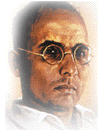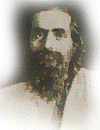

INDIAN LEADERS
| VINAYAK DAMODAR SARVARKAR | MADHAVRAOSADASHIV GOLAALKAR |
|
|
In Sir Richard Attenborough's Gandhi, there is a slightly sinister sadhu with long hair and beard, projected as the brain behind the Mahatma's assassination. To those familiar with the pantheon of Hindu nationalism, the physical resemblance between the celluloid sadhu and "Guruji" Madhav Sadashiv Golwalkar (1906-73), head of the Rashtriya Swayamsevak Sangh (RSS) from 1940 to 1973, is uncanny.
History, however, doesn't permit such fanciful interpretations. True, Golwalkar was imprisoned in the aftermath of the murder and the RSSs temporarily banned, but it was the Maharashtrian revolutionary and Hindu Mahasabha leader Vinayak Damodar Savarkar (1883-1966) who was the assassin Nathuram Godse's real ideological inspiration. Although Golwalkar was exonerated by a commission of inquiry and Savarkar acquitted by the court of actual involvement in the conspiracy, Hindu nationalism has had to live with the stigma of its two leading stalwarts being implicated in the Mahatma's murder.
It speaks volumes for the inherent appeal of this ideology that 50 years after the traumatic event, it is the self-confessed disciples of both Savarkar and Golwalkar who are at the helm of politics in India. To its detractors, the RSS with its 40,000 shakhas may be a "fascist" private army, but to those lakhs of swayamsevaks who turn up dutifully each morning to salute the saffron flag, it is the harbinger of a Hindu resurgence. A small sign of a people kept in bondage for a thousand years gradually coming into its own.
In their own ways, both Savarkar and Golwalkar would have endorsed the winds of change blowing away the old Nehruvian order. But for very different reasons. With his flowing locks and saffron garb, Golwalkar was every inch a "Guruji". Simple to the point of asceticism, he travelled widely inspiring his flock and spreading his version of moral rearmament. For his followers, he was the ideal karmayogi.
The thin, somewhat wiry and donnish Savarkar was a study in contrast. With his erudition, he fitted the description of an ideologue. If the idiom of Golwalkar was a blend of the traditional, Savarkar was a nationalist in the western mould. If Golwalkar sought to rekindle the spiritual values of Hindus through organisational zeal, Savarkar sought to transform Hindus into mirror images of those who controlled the levers of global power. Golwalkar was a missionary, Savarkar was a visionary.
Yet, Hindu nationalism wouldn't have been where it is today without the complementary inputs of the two. Savarkar -- who also inspired RSS founder K.B. Hedgewar -- put Hindutva on the intellectual map as early as 1923. But his Hindutva was a euphemism for aggressive, "secular nationalism of the Hindus". It had little to do with Hinduism. "The Hindu Mahasabha," he said, "is not a Hindu mission. It leaves religious questions ... to be discussed by different Hindu schools of religious persuasion. It is not a Hindu Dharma Mahasabha but a Hindu National Mahasabha."
To Savarkar, Hindutva was akin to a national ideology of all those who regarded India as its pitribhumi (fatherland) and punyabhumi (holy land). He nurtured that creature which has come to be known as the "political Hindu" -- an uncompromising modernist who, at the same time, shuns the melting pot of cosmopolitanism. Whether it acknowledges it or not, today's BJP bears the indelible stamp of Savarkar's political Hindutva. After all, Shyama Prasad Mookerjee, founder of the Jan Sangh (the BJP's earlier incarnation), cut his political teeth in Savarkar's Mahasabha.
Golwalkar had a deep-seated distaste for the excessive political thrust of Savarkar. To the architect of the RSS' nationwide expansion, the Hindus were never short of ideas or intelligence. What they lacked were discipline, organisation and character. "The root cause of our national tragedy then, a thousand years ago, and now, a thousand years after, is the same -- utter lack of organised and unified life among the Hindus."
So while Savarkar concentrated -- rather unsuccessfully -- on building alternatives to the Congress and ridiculing the RSS preoccupation with morning drills, Golwalkar shunned politics. It was, he used to say, "never the pivot of life". Even his endorsement of the Jan Sangh in 1951 was extremely grudging and arose from the experience of the 1948-49 ban on the RSS. His focus was on creating an elite corps that would in time transform the soul of India through leadership and moral example. It would exorcise alien influences and recreate a robust national culture: "It is only when a nation ... sticks to its roots of swadharma that it grows and blossoms."
Golwalkar's attempts to extend swadharma to politics proved less enduring. He flayed the Constitution for being a cut-and-paste exercise of imported ideals. He called for a "unitary" government and spoke out constantly against federalism. However, against the reality of electoral politics, his disciples have embraced federalism enthusiastically and even the swadeshi he advocated has been expediently reinterpreted to imply an Indian mental orientation. Likewise, the harsh exclusionary policies advocated by both Savarkar and Golwalkar towards the minorities have floundered in the face of democratic realities.
Savarkar's Hindutva and Golwalkar's cultural nationalism haven't been reduced to mere shibboleths. If Nehruvian secularism has been politically contested, if the idea of a strong, not intrusive, state has found expression through the Pokhran blasts, if there is such a thing called a Hindu "vote bank" in existence and if there is a greater appreciation of India's cultural identity, much of the intellectual initiatives can be traced back to the activism nurtured by these two stalwarts. Savarkar and Golwalkar died on the fringes. Today, their legacy is a key feature of the mainstream.
(c) Copyright reserved at Satya srinivas web designers
Any thing or any content should not copied or edited without the permission of the owners.
All disputes in the regard of the site will be put at the high court of Hyderabad.